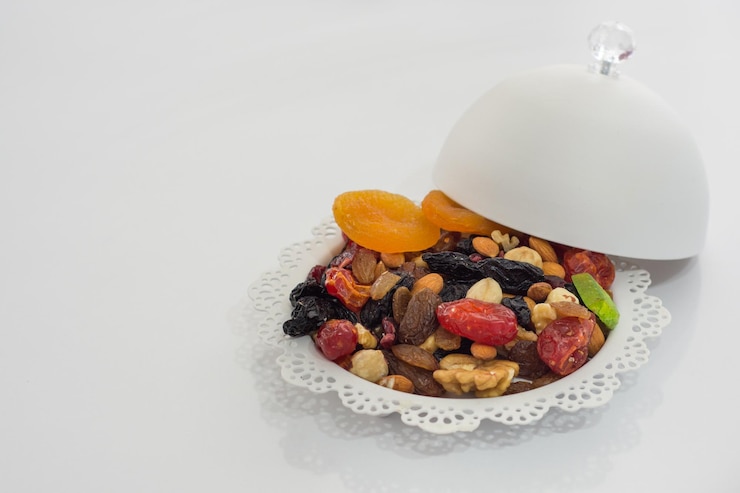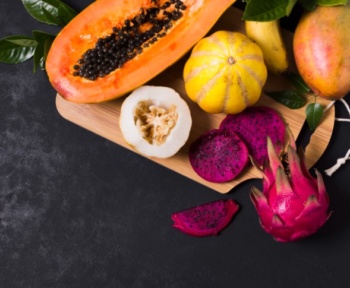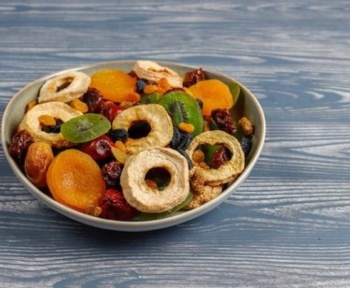Introduction
Dried fruits – those little bite-sized wonders – are more than just a quick snack. They’re an easy way to add flavour, nutrients, and a bit of sweetness to just about anything. Dried fruits are surprisingly versatile, from the sweet kick they bring to a salad to the punch they pack in baked goods. Let’s dive into how you can use dried fruits and why they’re not just for snacking anymore!
What Are Dried Fruits?
What Exactly Are Dried Fruits?
At their core, dried fruits are simply fruits that have had most of their water content removed through drying techniques. This makes them shelf-stable and gives them a concentrated, sweet flavour. It’s like fruit but more intense. Classic examples include raisins, apricots, and dates. But a whole world of dried fruits is out there waiting for you to try!
What Kinds of Dried Fruits Are There?
If you’re new to dried fruits (or just curious about expanding your snack game), here are some of the most common ones:
- Raisins: The classic dried fruit. Sweet, soft, and perfect in trail mix or eaten straight from the box.
- Dates: Oh, dates! The rich, caramel-like sweetness that makes them ideal for smoothies or desserts.
- Apricots: Slightly tangy and chewy, they’re a perfect addition to savoury dishes or just as a snack.
- Figs: Think of them as nature’s candy. Sweet and full of fibre, they’re great for munching or adding to salads.
- Prunes: Dried plums have a reputation, but they’re surprisingly delicious for digestion.
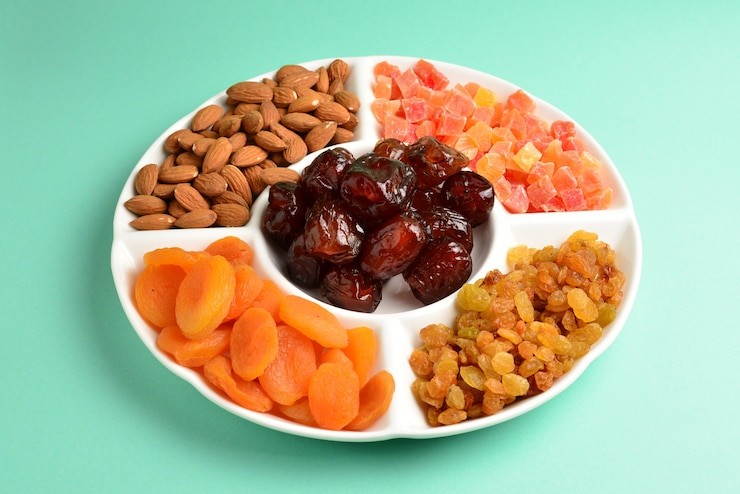
How Are Dried Fruits Made?
So, how does that transformation from fresh fruit to dried goodness happen? There are several drying methods: air drying, sun drying, and freeze-drying, to name a few. Each method removes moisture, preserving the fruit and concentrating its flavour. The beauty of dried fruits is that they retain almost all their nutrients in a much more compact form. So, you’re getting all the good stuff minus the water.
Health Benefits of Dried Fruits
Okay, we get it – dried fruits are tasty. But what about the health perks? Spoiler alert: They’re pretty awesome for you too.
Packed with Goodness
Dried fruits contain essential nutrients like fibre, potassium, and antioxidants. These little bites deliver vitamins A, C, and K, crucial for healthy skin, immune support, and overall well-being. Plus, since the water’s been removed, you’re getting more nutrients in every bite.
Heart Health Helper
Certain dried fruits, like apricots and raisins, are rich in potassium. Potassium is key for heart health because it helps regulate blood pressure, reducing your risk of hypertension and heart disease. And don’t forget those antioxidants – they’re fighting inflammation and oxidative stress, which can protect your heart over time.
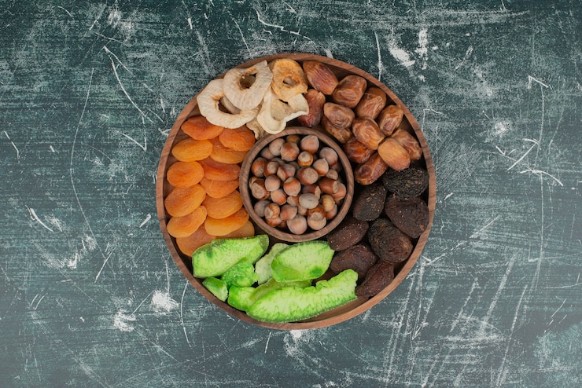
Digestive Support
If you want to improve your gut health (and who isn’t?), dried fruits like prunes should be your go-to. They’re well-known for their digestive benefits, mainly because they’re loaded with fibre. That fibre helps keep things moving in your digestive tract, ensuring regularity and supporting overall gut health.
Boost Your Energy
Next time you need a little pick-me-up, skip the candy bar and reach for dried fruits like dates or figs. They’re loaded with natural sugars that give you instant energy. Plus, they’re full of fibre, which keeps that energy steady for longer. So, whether you’re about to hit the gym or need a snack to get through the afternoon slump, dried fruits have your back.
Immune System Boost
Did you know that the antioxidants in dried fruits help boost your immune system? They’re a great way to keep your body fighting off free radicals and reduce the risk of getting sick. And, with the vitamins packed in dried fruits – especially vitamin C – you’ll be well-equipped to stay healthy year-round.
Culinary Uses of Dried Fruits
Dried fruits aren’t just for snacking – they’re secretly the star ingredient in many dishes. Trust me, once you start using them in cooking, you’ll wonder why you didn’t think of it sooner.
In Baking and Cooking
Baking is one of the easiest ways to incorporate dried fruits into your meals. Raisins, apricots, and dates work wonders in cookies, muffins, and bread. For that sweet-savoury balance, you can also get creative and toss some dried fruits into savoury dishes like couscous, pilafs, and tagines. It’s like they were made for each other.
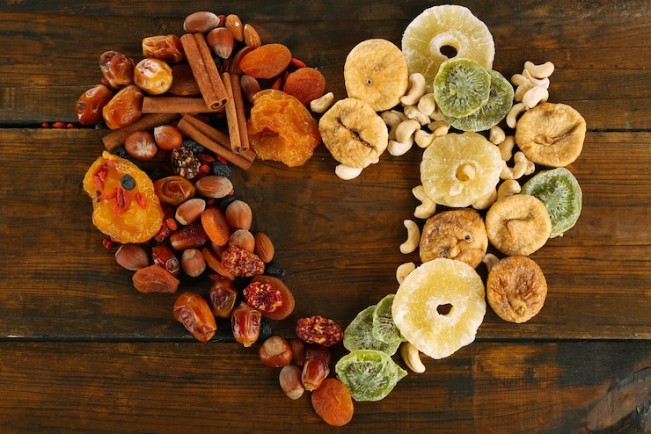
Smoothies and Drinks
Add dried fruits to your smoothies to boost natural sweetness and extra fibre. Apricots, dates, and raisins blend beautifully and are sweet enough without being overpowering. If you’re short on time, soaking them overnight makes them soft and easy to blend into your favourite drink.
Trail Mix and Snacks
Trail mix – is there a better snack combo? You get salty, crunchy, and sweet all in one bite. Throw in some dried cranberries, raisins, or apricots with your favourite nuts and seeds, and boom – a perfect snack that’ll keep you satisfied for hours. Dried fruits are your MVP in this category, no question.
Salads and Garnishes
Salads don’t always get the love they deserve, but adding dried fruits can elevate the experience. Cranberries, apricots, or raisins make an excellent topping for salads, bringing a sweet burst that balances the savoury ingredients. Try it next time – you won’t regret it.
Dried Fruits in Healthy Snacks and Meal Prep
One of the most incredible things about dried fruits is how easy they are to include in your daily routine. Whether you’re meal prepping for the week or need a healthy and delicious snack, dried fruits have you covered?
Snack Ideas with Dried Fruits
Need some snack inspiration? Here are a few ideas:
- Energy Bars: Combine oats, dried fruits, and a little honey or maple syrup to make your DIY energy bars. Perfect for a pre-workout snack or as a grab-and-go breakfast.
- Yoghurt Toppings: Add raisins, dried apricots, or figs to your yoghurt for a fun texture and a boost of sweetness.
- Fruit Leather: Turn dried fruit into homemade fruit leather. Puree your favourite dried fruit, spread it thin, and dry it out. It’s a fun (and healthy) treat for kids and adults alike.
- Smoothie Ingredients: Dried fruits like dates and apricots make a great addition to smoothies – soak them overnight to make them easier to blend.
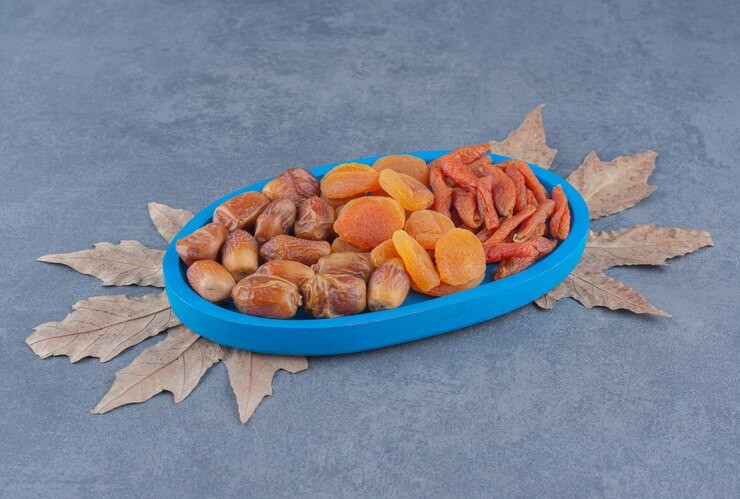
Meal Prep with Dried Fruits
Dried fruits are a meal prep enthusiast’s best friend. They’re easy to store, last a while, and can be added to just about any meal:
- Breakfast: Stir some dried fruit into oatmeal or yoghurt for a quick and filling breakfast.
- Lunch: Add dried apricots or raisins to a salad or grain bowl to give it a sweet kick.
- Dinner: Apricots and figs are great in savoury dishes like couscous or stews. Their natural sweetness balances beautifully with savoury spices.
Storage Tips for Dried Fruits
Store your dried fruits in an airtight container in a cool, dry place to keep them fresh for as long as possible. If you want them to last even longer, pop them in the freezer. They’ll keep for months, and you’ll always have a snack.
Dried Fruits in Cultural and Traditional Dishes
Dried fruits have a long history of use in cultures around the world. From Middle Eastern tagines to Asian desserts, dried fruits bring a unique flavour to many traditional dishes.
Middle Eastern Dishes
In the Middle East, dried apricots, figs, and dates are often added to stews, pilafs, and tagines. The sweetness of these fruits complements the savoury flavours of the spices, creating a perfect balance that’s comforting and exotic.
Asian Recipes
In Chinese cuisine, dried longans and dates are frequently used to sweeten soups, while in India, dried fruits like apricots and raisins find their way into rice dishes and desserts. It’s a great way to add natural sweetness without using refined sugar.
Western Cooking
In the West, dried fruits are often incorporated into baked goods like cakes, muffins, and cookies. They’re also a tasty addition to granola, and you can sprinkle them on top of cereal for an added flavour boost.
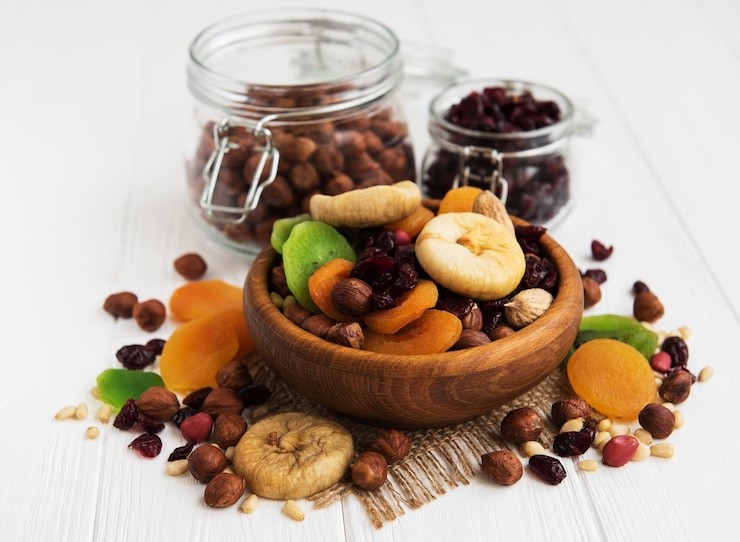
Dried Fruits for Health and Wellness
Not only are dried fruits delicious, but they’re also packed with benefits that can boost your overall wellness.
Natural Sweeteners
Looking to cut back on sugar? Dried fruits like dates and raisins can be natural sweeteners in cooking and baking. No added sugar is needed, just the good stuff from the fruit itself.
Helpful for Weight Management
Dried fruits are your friend if you’re trying to manage your weight. Their high fibre content helps keep you feeling full, so you’re less likely to overeat. They’re naturally sweet, so you can satisfy your cravings without reaching for something unhealthy.
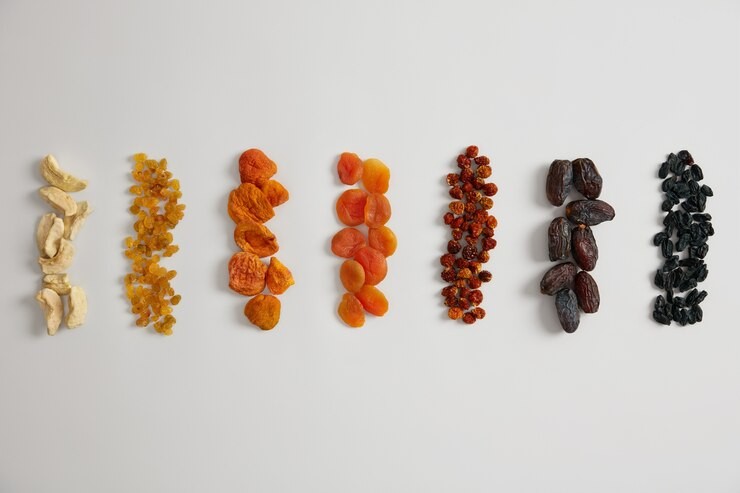
Detox Benefits
Prunes (yep, those prunes!) are famous for their digestive benefits, helping to keep everything running smoothly. They’re a great addition to any detox regimen, supporting healthy digestion and regularity.
Superfood Status
When it comes to superfoods, dried fruits are right up there. They pack a serious punch with all those vitamins, minerals, and antioxidants. Figs, apricots, and dates are incredibly nutrient-rich, making them a powerhouse snack.
Conclusion
Dried fruits are more than just a sweet treat or snack. They’re versatile, healthy, and packed with flavour. Whether adding them to your salads, tossing them in baked goods, or just munching on them throughout the day, they’re a simple way to improve your diet. Dried fruits should be in your pantry, as they have a long shelf life and endless uses.
Interview with Nutritionist Emma Peters
“Dried fruits are an incredibly easy way to boost your nutrient intake. They’re perfect for anyone looking to add fibre, vitamins, and antioxidants into their diet, without much extra effort.” — Emma Peters, Nutritionist.
Final Thoughts
Incorporating dried fruits into your daily routine isn’t just easy – it’s beneficial. There’s no reason not to enjoy these natural wonders, from smoothies to snacks to full-on meals. So, grab a handful, toss them into your dish, and start reaping the health benefits today!
FAQs
Dried fruits contain essential nutrients like fibre, antioxidants, vitamins, and minerals. They help improve digestion, boost heart health, support weight management, and provide a natural energy boost.
Yes! Dried fruits like apricots, figs, and raisins can be used in savoury dishes. They add a sweet-tangy contrast to stews, salads, and even couscous or pilafs, creating perfect flavours.
To keep dried fruits fresh, store them in an airtight container in a cool, dry place. To preserve their texture and flavour, you can refrigerate or freeze them for a longer shelf life.
While fresh and dried fruits have health benefits, dried fruits are more concentrated in nutrients because they have had their water removed. However, they are higher in calories, so moderation is key.
Dried fruits can aid in weight loss because they are high in fibre, which helps keep you full and satisfied longer. Just be mindful of portion sizes since they are calorie-dense due to the lack of water content.


